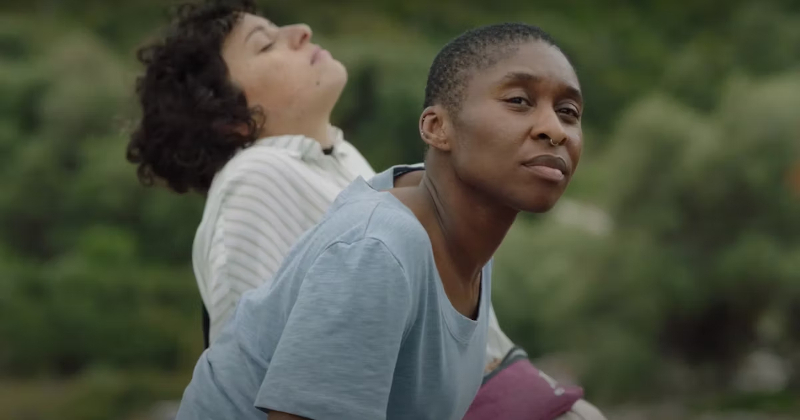Director – Anthony Chen – 2023 – Singapore, UK, France, US – Cert. 15 – 93m
****
A Liberian woman and former London student from a privileged background has lost everything and lives on her wits in a Greek holiday resort until she makes a connection with a tour guide – out in UK cinemas on Friday, March 29th
A T-shirt-clad back sits on the beach, facing away from us, looking out to a calm, blue sky and sea. A figure of indeterminate gender at this point. In an isolated, unpopulated landscape. However, as this young black woman (Cynthia Erivo) starts to make her way around the place, elements of both are gradually revealed to us. She travels on a bus with white tourists to a small, sleepy town where Greek lettering on the shop signs gives us some idea of where we are. Later, she takes the return journey and is back on the beach. She washes her underwear (she appears to only have the one pair) and T-shirt in the sea, letting them dry in the sun while she shelters in a cave. She momentarily panics at the sight of a coastguard vessel before realising it’s merely a small fishing skiff.
In the small, sleepy, tourist town, the young woman is displaced. She furtively swipes packets of sugar from restaurant tables when she hopes no-one is looking. She makes enquiries in perfect English about how to book a group table at a restaurant and asks to use the lavatory but is told, by the no-nonsense white owner, that unfortunately it’s for paying customers only. On a beach of holidaymakers, she sees a woman offering foot massages and making money, so promptly pilfers a bottle of olive oil from a table at a nearby restaurant and sets herself up as a foot massager, making some honest money in the process.
She visits a stall where a black man (Ibrahima Ba) is selling giraffe statuettes, excusing herself when he starts asking too many questions. Later, at night, he spots her and follows her through the streets as she attempts to get away, the pair of them later running into local cops after he’s caught her by the arm. Separated, to her relief, she then has to explain herself to a policeman and tells him that she’s a journalist before she’s allowed to move on.
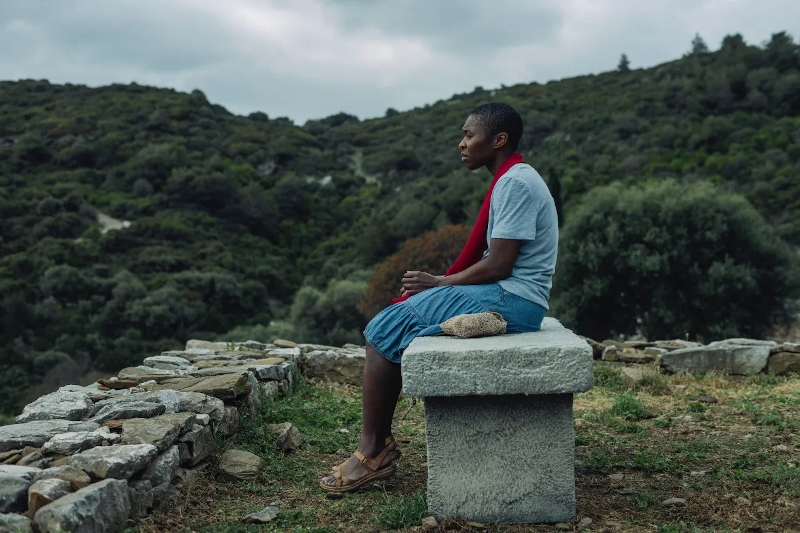
Taking some time out to sit quietly on a seat at an isolated site of ancient ruins, she surreptitiously spots a tour group and tags along at the back. The group’s American guide is Callie (Alia Shawcat), who doesn’t think much of her charges, until our woman asks a half-way intelligent question that gets Callie talking profusely about the site’s history. While her charges wander off to explore the ruins, Callie relaxes and shares a cigarette with the woman, who introduces herself as Jacqueline. “I don’t like them to see me smoke,” says Callie, “because then the older ones – who tip – tip less.” There is both a friendship and an intimacy between them; yet, at the same time, Jacqueline is guarded, making up stories about staying on in a house with her husband.
On later days, Jacqueline returns to the site both to sit along by herself and to spend more time with Callie on her guide breaks. One day, she takes advantage of the parked tour bus when the driver isn’t minding it, going through handbags on seats for money or anything else that might be useful, only to be caught red-handed by the driver and defended by Callie. The pair become closer as more days pass, going for a meal together and Jacqueline visiting her villa to taker a relaxing bath while Callie puts Jacqueline’s clothes in the washing machine. But something snaps inside Jacqueline mid-soak, and she takes her clothes, sodden in mid-wash cycle, and leaves the house.
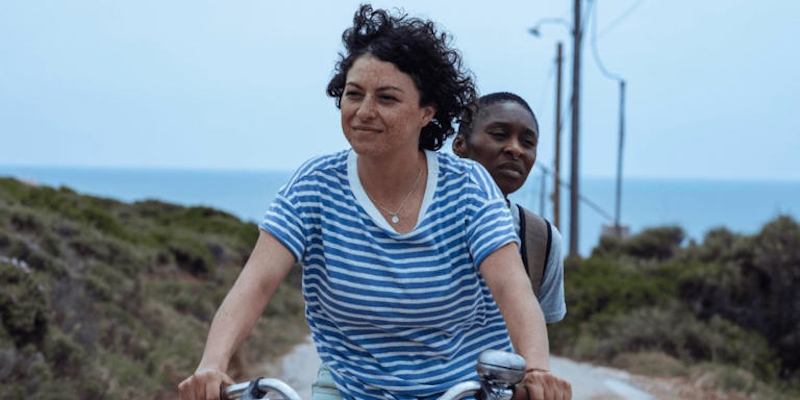
This languorous, sun-drenched narrative is punctuated by other episodes from Jacqueline’s past. Flashes reveal her life as a student in London, travelling on a SouthEastern train (again, the deft use of verbal cues on signs to instantly reveal a national location) with her English girlfriend (Honor Swinton-Byrne) or staying in the house of the latter’s reasonably comfortable family. Further flashes reveal her privileged life in Liberia, where her daddy was a government minister and she, her parents (Vincent Vermignon and Suzy Bemba) and her sister (Zainab Jah) lived a life of luxury in a gated, guarded house until one day, they returned from a trip to find the gates open and the guards gone. With much worse to come.
The film is a fairly low budget affair, dealing with small numbers of characters, sometimes with much larger numbers of extras (tourists crowding the beach, and army including several child soldiers invading her Liberian family’s compound and house, perpetrating atrocities on her parents and her sister). A life of wealth and privilege is, in a short space of time, replaced by an unpleasant experience of death and rape.
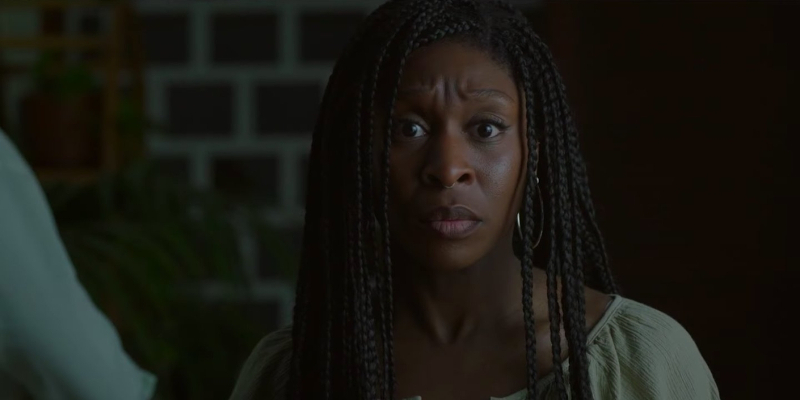
And, curiously, the film seems to come unstuck at this point: director Chen, who has a great gift for handling the interaction between a very small number of characters in a scene, and slowly unfolding and involving narratives, seems completely out of his depth in dealing with this flashback to the atrocity. Unlike his earlier, Singaporean films Ilo Ilo (2013) and Wet Season(2019), he didn’t write this one himself – the film was made from a script by Susanne Farrell and Alexander Maksik based on the latter’s novel – and it’s almost as though he can’t bear to shoot such an unpleasant scene. He deals with the rape of Jacqueline’s sister by showing their separate faces as the two retain eye contact throughout the incident, but somehow, this doesn’t quite work onscreen. Since it’s the revelation of the hitherto unseen trauma that’s been troubling the heroine throughout the narrative up to this point, that’s something of a problem.
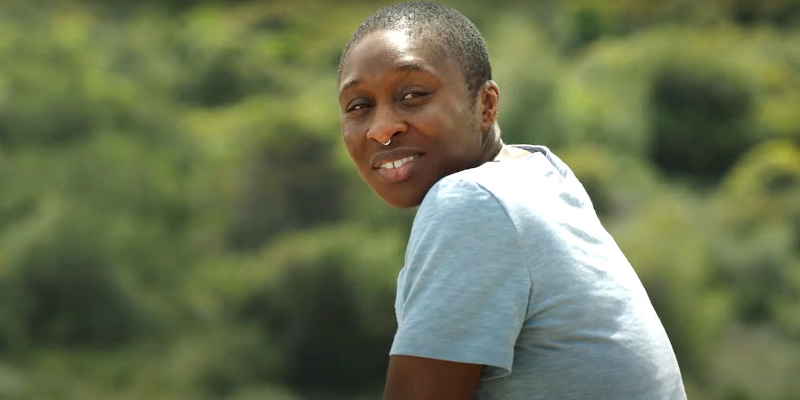
Aside from that ultimate focal point, the rest of the narrative is effective as a character study of, as the title suggests, a woman adrift in a landscape the average Western viewer would associate with rest and relaxation. Erivo is terrific as the woman stripped of her former privilege just trying to get by in as foreign land, Shawcat is suitably relaxed as the US ex-pat not in quite the same dire straits, but related in the sense that she is taking time out from the land of her birth and trying to figure out what to do next.
Cameraperson Crystel Fournier (Wildfire, Cathy Brady, 2020; Girlhood, Céline Sciamma, 2014) shoots the locations – the Greek island, the UK interiors, the Liberian family life and its collapse – like further characters in the drama.
Even if the whole thing unravels a little when it finally gets to where it wants to go, and therefore doesn’t quite work, the journey getting there – the characters, the actors performance interpreting them, the various landscapes in which everything takes place – prove highly effective. A fascinating piece of work, if a flawed one.
Drift is out in cinemas in the UK on Friday, March 29th following its screenings at Glasgow Film Festival which ran from Wednesday, February 28th to Sunday, March 10th.
Trailer:
